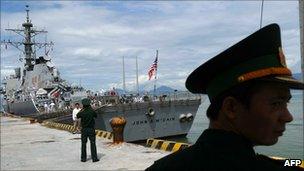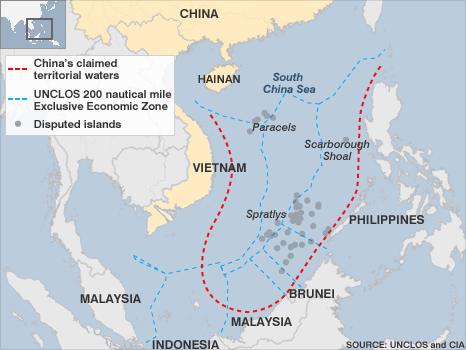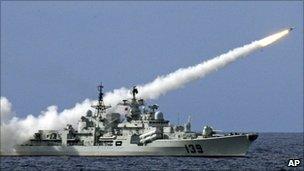Why are South China Sea tensions rising?
- Published

The US has increased military and diplomatic ties with Vietnam in recent months
Imagine an exchange of fire between Chinese and Vietnamese navies in the South China Sea.
Or just an accidental bump between Chinese and American warships, as high-stakes manoeuvring gets out of hand.
Or the arrest by China's navy of hundreds, not just dozens, of Vietnamese fishermen in disputed waters, sparking US voices to support Hanoi against Beijing - or the other way around.
Fanciful scenarios? Certainly.
But the impact of a conflict over a storm-tossed and otherwise unremarkable stretch of water south of China and bordered by most South East Asian states would be far-reaching.
The shipping of Middle Eastern oil to Japan would be at risk, north-east Asian economies could stall, trade between China and South East Asia could be blocked in tit-for-tat recriminations and much more if the world's two biggest powers became locked in combat.
On alert
That is why a discernible ramping-up of tension has excited the analyst community that watches the South China Sea issue.

When US Secretary of State Hillary Clinton spoke in Hanoi in July, she aligned the US firmly with South East Asia's approach to overlapping claims in the South China Sea.
She said: "The United States supports a collaborative diplomatic process by all claimants for resolving the various territorial disputes without coercion. We oppose the use or threat of force by any claimant."
In response, China has described the South China Sea as a "core interest", complained of "encirclement" and lambasted unwarranted interference by the US in matters that do not concern it.
A series of moves by the various players has brought the region to a point where "the status quo is not sustainable", says Ian Storey, fellow at the Institute of Southeast Asian Studies in Singapore.
There has been a "change of tone" and concerns in the region have "increased markedly", he says.
Carl Thayer, a professor of politics at the Australian Defence Force Academy in Canberra, concurs.
China has "undertaken provocative actions to underscore its national security concerns. Chinese actions have resulted in growing friction with Vietnam and have spilled over to affect US strategic interests.
"The United States has responded by asserting its right to freedom of navigation and has moved to develop a strategic partnership with Vietnam," he says.
No progress
That is not how China sees it, of course.
It was already angry about the activities of US military vessels in China's Exclusive Economic Zone (EEZ) which it says are not "innocent", as required by the rules governing such behaviour.
Sovereignty over the entire South China Sea is the bigger issue, however, not only because of suspected, albeit unproven, deposits of oil and gas.

Both China and the US have increased naval drills in the Asian region
More important is the fisheries industry and the vital issue of freedom for trade through some of the busiest shipping lanes in the world - 80% of China's energy imports pass through these waters.
Back in 2002, China and the Association of South East Asian Nations (Asean) signed a Declaration of Conduct on how to tackle the disputes.
But in scores of meetings since, they have failed to act on specified confidence-building measures which could implement the declaration.
A China-Asean working group on the Declaration of Conduct has met only four times since 2004 but could meet a second time this year.
US Defence Secretary Robert Gates is also scheduled to attend the first-ever meeting of Asean defence ministers - China is invited but is haggling over whether to attend - set for October.
Some analysts hope these meetings will help work towards a real code of conduct in the seas - but there remains a fundamental divergence in approach between China and Asean.
Although China has been happy to regulate economic relations with Asean as a bloc - touting the success of the China-Asean Free Trade Area (Cafta) in place since the beginning of 2010 - it wants to handle political issues differently.
It has consistently said sovereignty disputes should be tackled bilaterally, between China and each individual claimant country.
Asean members are unwilling to take that approach, knowing it weakens them in talks with a power that is now crucial to almost all their economies.
'Coercive diplomacy'
While the big powers, the US and China, battle it out with more bellicose rhetoric and a series of competing military exercises around the region, key countries within Asean are watching warily.
With Vietnam as chair of Asean this year, the issue of the South China Sea has come to the fore and a new level of consensus has been reached within Asean.
"South East Asians were, and continue to be, fully aware of both the inherent promises and dangers that China presents, whose traditional symbol is after all a dragon," notes Indonesia's Dewi Fortuna Anwar, research professor at the Indonesian Institute of Sciences.
"During the Cold War, China was regarded as an unmitigated threat. Today, however, Asean believes that the best course of dealing with China, with its vast economic potential and growing military might, is to engage and integrate it fully into the regional order," she wrote in The Jakarta Post.
The experts are agreed that the balance of power in East Asia is shifting.
"Twenty years ago, no-one was in the position to enforce any claims. Now China has the wherewithal to pursue more coercive diplomacy - so it can't go on like this," says Ian Storey.
"As the PLA grows in strength, South East Asians have become more aware of the gap between rhetoric and reality. As a result, China's platitudes are wearing thin."
More than ever, the dangers of failing to engage in a more serious search for peaceful arrangements are clear.
- Published10 August 2010
- Published3 August 2010